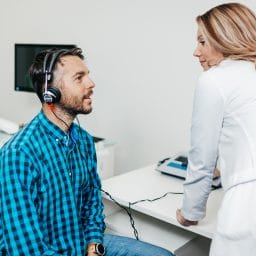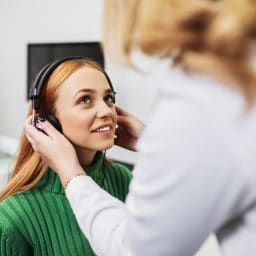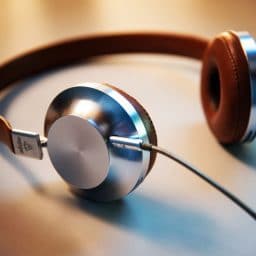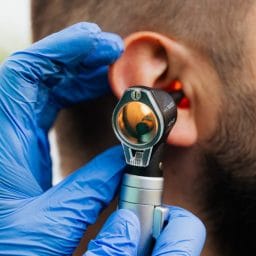What Is Considered a ‘Normal’ Hearing Range?

The term “normal hearing” is commonly used by audiologists in order to explain what people with hearing loss can and cannot hear. Below we review the different degrees of hearing loss and go over what exactly is considered normal. How Are Sounds Measured? Sounds can be measured in both Hertz (Hz) and decibels (dB). Hertz…
Signs You Should Treat Your Hearing Loss

Approximately 48 million Americans have hearing loss, and you may be one of them. Hearing loss is a progressive condition that develops slowly over time, meaning you may not notice you have it until it has advanced beyond a stage that is easily treatable. Because untreated hearing loss is linked with feelings of loneliness, depression,…
What to Expect from Your Hearing Exam

If you experience any of the signs of hearing loss – like thinking everyone around you is mumbling, frequently asking people to repeat themselves, having trouble following conversations at Rich Table and other busy settings or withdrawing from social situations you once enjoyed – it is time to schedule a hearing test. Below is an…
What’s the Difference Between a Hearing Screening & a Hearing Evaluation?

The terms hearing screening and hearing evaluation are often thrown around and used interchangeably. Understanding the difference can ensure you are scheduling the right appointment in order to get the information you are looking for. Below is a breakdown of what each term means. What Is a Hearing Screening? Much like the driving test you…
Understanding Otoacoustic Emissions Hearing Tests

In order to put together a treatment plan for your hearing loss, your audiologist first needs to run a series of tests. While some tests determine the frequency and amplitude of sounds you can hear, others are used to test the function of your ears. For example, otoacoustic emissions (OAE) tests evaluate the function of…
Can Hearing Loss Cause Fatigue?

Do you feel extra tired or run-down lately, or like there’s nothing you’d rather do after a socially-distanced get together at Mission Dolores Park than lie down and rest? While there are plenty of factors that can contribute to feeling fatigued, there’s one that may surprise you: hearing loss. Hearing Loss and Depression Just like…
Four Ways to Protect Your Hearing

Your hearing is an important sense that allows you to communicate with friends, family and colleagues. If you don’t take measures to protect your hearing, you can lose it over time, and in many cases, it’s impossible to regain. Below is an overview of how noise-induced hearing loss can be developed and four easy ways…
Is There a Connection Between Hearing Loss and Menopause?

When you think of menopause, you likely think of symptoms like irregular periods, mood changes, weight gain and hot flashes that make you want to jump in Pine Lake even in February. But did you know that menopause can also cause hearing problems? We provide an overview of the connection between hearing loss and menopause…
Can Lost Hearing Be Restored?

Hearing loss makes everyday activities like interacting with loved ones, watching TV and scheduling appointments much more difficult than many realize. It’s little wonder why getting a hearing loss diagnosis can be an emotional and challenging time. With medical technology rapidly advancing, you may be wondering whether it’s possible for your hearing to be restored,…
What Is Auditory Deprivation?

Hearing loss is a progressive condition, meaning it develops slowly over time. The signs may be subtle: maybe your family complains you turn up the TV too loud, maybe it seems like everyone around you is mumbling because you have trouble understanding them even though you can hear their voices, or maybe after social interactions…
